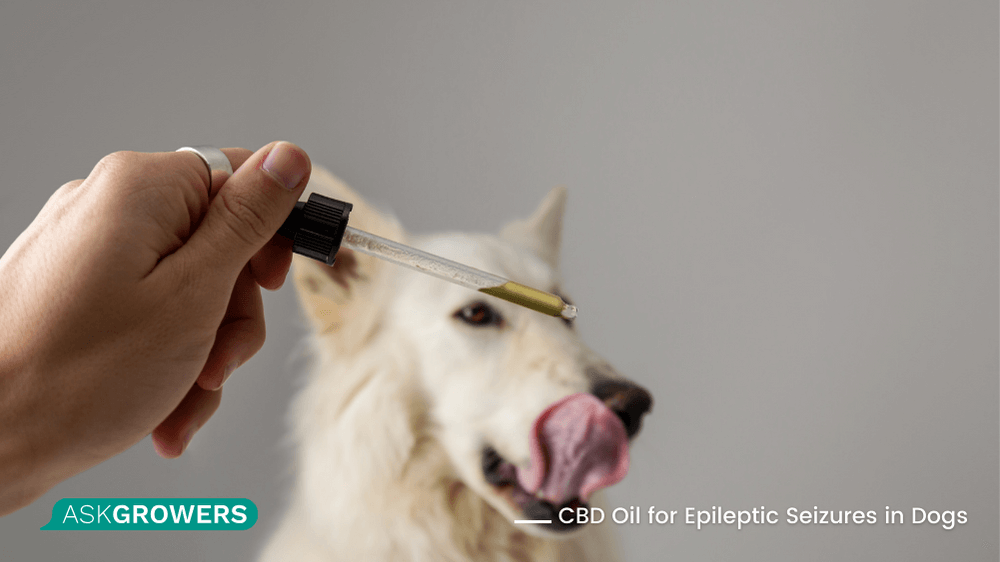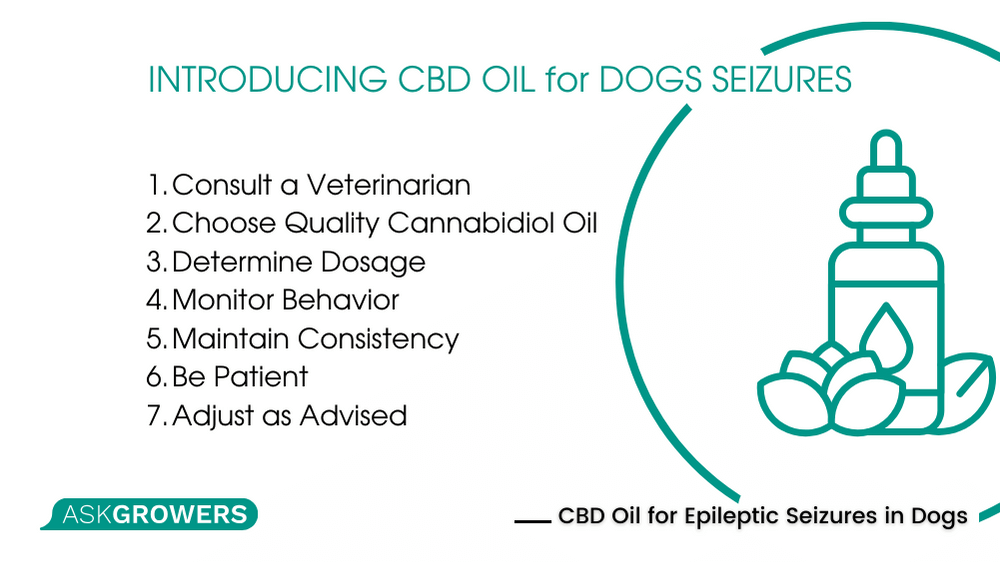Understanding Seizures in Dogs and Exploring СBD Oil as a Therapeutic Option

Seizures in dogs are distressing for the animal and owner alike. Caused by abnormal brain activity, they result in convulsions, loss of consciousness, and uncontrollable movements. Canine epilepsy, a common condition, brings recurring convulsions, significantly affecting a canine's life quality.
For pet owners, watching seizures is heartbreaking, with overwhelming fear and helplessness. To provide relief, many turn to cannabidiol oil from non-psychoactive marijuana. The CBD oil for epileptic seizures in dogs has gained popularity for potentially reducing seizure severity and frequency through the endocannabinoid system's neural activity influence. This natural option has captivated pet owners wanting to better their pets' lives.
This guide enlightens canine epilepsy's effects and the CBD oil for epilepsy in dogs trend to manage convulsions. It explores hemp oil's anti-inflammatory and neuroprotective benefits, lessening seizure impact. Using this information, pet owners can make informed decisions for their dogs' well-being.
Unraveling Canine Epilepsy: Understanding the Causes and Impact
Epileptic convulsions in canines can be life-altering and distressing. We will explore canine epilepsy's intricacies, origins, impact, and potential safeguards.

Understanding Canine Epilepsy: Canine epilepsy[1] is a neurological disorder marked by recurring seizures. These bursts of brain activity lead to focal (specific body part) or generalized convulsions (entire body).
Prevalence and Impact: Dogs of diverse breeds and ages can experience epilepsy, affecting their lives and causing owner distress.
Types of Seizures: Canines endure various seizure types[2]: tonic-clonic (grand mal), absence (petit mal), and focal convulsions, each with unique traits.
Potential Causes and Triggers: Genetics, brain irregularities, neurotransmitter imbalances, stress, routine changes, and environmental factors contribute to convulsions[3].
Impact on Dogs: Convulsions disrupt daily activities, leading to disorientation, fatigue, and post-seizure behavior changes.
Seeking Preventive Measures: While full prevention is complex, managing triggers-consistent routines, stress reduction, and balanced diets can lower seizure occurrence[4].
By understanding the complexities of canine epilepsy, pet owners gain insights crucial for safeguarding their pets' well-being. Through informed care and preventative strategies, the impact of this condition on canines' lives can be minimized, fostering a healthier and happier life for our furry companions. The holistic approach often includes CBD oil for dogs epilepsy.
Read Also: Finding Calm: How CBD Chews Aid in Reducing Anxiety in Dogs
CBD Oil for Seizures in Dogs: A Holistic Management Strategy
Pet CBD oil, derived from non-psychoactive marijuana, is gaining recognition as a potential alternative for alleviating[5] pets' convulsions. It is an extract from the cannabis plant that contains minimal or no THC, the psychoactive compound.

Cannabidiol interacts with the endocannabinoid system in canines, a network of receptors that regulates various bodily functions. When introduced into a dog's body, hemp stimulates these receptors, which results in a range of effects, including anti-inflammatory, analgesic, and calming properties. Also, hemp helps with other diseases such as arthritis, so CBD oil for joint pain in dogs can be helpful.
In comparison to other CBD treats for dog, hemp oil distinguishes itself with its swift onset of action. It is due to its efficient absorption and interaction with the endocannabinoid system. As a result, canine owners may observe quicker responses when using cannabis oil to manage their canines' seizure symptoms. Cannabidiol oil has its benefits, but there are some side effects too:
| Benefits | Possible Side Effects |
|---|---|
|
|
Research suggests that CBD oil for epilepsy dogs may offer relief from seizures in pets. By influencing neural activity and interacting with GABA receptors, hemp can help regulate excessive electrical impulses in the brain. The modulation may lead to a reduction in the frequency and intensity of convulsions, ultimately improving the dog's quality of life.
A growing body of research supports the potential efficacy of CBD oil for seizures dogs. Studies have documented instances of decreased seizure frequency and improved seizure control with cannabidiol supplementation. The evidence indicates that cannabidiol's anti-inflammatory and neuroprotective properties contribute to its anticonvulsant effects.
Hemp oil offers a comprehensive approach to managing seizures in canines. Its interaction with the endocannabinoid system, coupled with the rapid action and potential benefits, make it a promising option. With ongoing research shedding light on its effectiveness, CBD pet treats have the potential to improve the lives of pets and provide much-needed relief from seizure symptoms.
Introducing CBD Oil for Dogs Seizures: Best Practices
When using CBD oil for dogs with seizures, a methodical approach is vital. We outline crucial phases for administering cannabis oil to canines with convulsions, ensuring effectiveness and well-being.

Consult a Veterinarian: Before using hemp oil, consult your vet to ensure suitability and to receive dosage guidance.
Choose Quality Cannabidiol Oil: Opt for dog-specific, reputable, and additive-free hemp oil products. Consider full-spectrum options for added benefits.
Determine Dosage CBD Oil for Dogs with Seizures: Begin with a low dose based on your pet's weight and seizure severity. Gradually increase while monitoring the response.
Monitor Behavior: Observe changes in seizure frequency and overall well-being. Adjust the dosage as needed.
Maintain Consistency: Administer cannabis oil at the same time daily to ensure a steady level in your dog's system.
Be Patient: Allow time for cannabidiol oil to take effect and note gradual improvements in seizure symptoms.
Adjust as Advised: Modify the dosage based on your vet's guidance and your canine's response.
Prioritize your dog's safety and well-being. Choose high-quality hemp oil or CBD pet drops designed for pets and seek guidance from your vet for the best choice for your furry companion.
Best CBD Oil for Dogs Having Seizures: Expert Recommendations
Here's a curated selection of the best cannabis CBD oil for seizures in dogs, as recommended by AskGrower's Experts. These products have been handpicked to provide effective relief and support for your furry companion's well-being.
Remember to consult your veterinarian before introducing any new supplement to your pet's regimen, and closely monitor your pet's response for optimal results.
Conclusion
We've explored hemp oil's potential benefits for dogs with seizures, highlighting its role as an alternative solution. The link between cannabidiol and canine well-being reveals insights valuable to pet owners and companions.
Cannabis oil, derived from non-psychoactive marijuana, offers a natural seizure relief option. Potential benefits of CBD oil for dogs anti seizures include the following:
Reduction in seizure frequency and intensity
Anti-inflammatory properties
Calming effects on neural activity
Natural alternative with no psychoactive effects
Choose quality CBD products for pets from reputable brands, following vet recommendations. We also recommend consulting a vet before starting hemp treatment. Your vet will guide product selection, dosage, and progress monitoring for safe and effective use.
In conclusion, cannabis oil's potential benefits for canines with convulsions are compelling. In the evolving world of cannabis and animals, informed cannabidiol use offers hope for enhancing furry companions' quality of life.
Read Also: Relieving Pain in Dogs: Exploring the Best CBD Products for Pain Relief
Sources
AskGrowers holds a solid dedication to maintaining high standards of research and ensuring the reliability of our content. Our fundamental ideals revolve around providing substantial information backed by evidence and abstaining from making unfounded claims. Our main emphasis is on knowledge derived from solid evidence, which is acquired through thorough processes involving peer-reviewed studies, renowned research establishments, and respected professional associations.
-
Mette Berendt, Robyn G. Farquhar, Paul J. J. Mandigers, Akos Pakozdy, Sofie F. M. Bhatti, Luisa De Risio, et al. "International veterinary epilepsy task force consensus report on epilepsy definition, classification and terminology in companion animals." BMC Veterinary Research. 2015. Available at: https://bmcvetres.biomedcentral.com/articles/10.1186/s12917-015-0461-2
-
Luisa De Risio, Sofie Bhatti, Karen Muñana, Jacques Penderis, Veronika Stein, Andrea Tipold, Mette Berendt, Robyn Farquhar, Andrea Fischer, et al. "International veterinary epilepsy task force consensus proposal: diagnostic approach to epilepsy in dogs." BMC Veterinary Research. 2015. Available at: https://bmcvetres.biomedcentral.com/articles/10.1186/s12917-015-0462-1
-
Johanna A. Forsgård, Liisa Metsähonkala, Anna‐Mariam Kiviranta, Sigitas Cizinauskas, Jouni J.T. Junnila, Outi Laitinen‐Vapaavuori, and Tarja S. Jokinen. "Seizure‐precipitating factors in dogs with idiopathic epilepsy." J Vet Intern Med. 2019. Available at: https://www.ncbi.nlm.nih.gov/pmc/articles/PMC6430923/
-
Rowena M. A. Packer, Sarah L. Hobbs, Emily J. Blackwell. "Behavioral Interventions as an Adjunctive Treatment for Canine Epilepsy: A Missing Part of the Epilepsy Management Toolkit?" Front. Vet. Sci., 2019. Available at: https://doi.org/10.3389/fvets.2019.00003
-
Heidrun Potschka, Sofie F.M. Bhatti, Andrea Tipold, Stephanie McGrath. "Cannabidiol in canine epilepsy." The Veterinary Journal, 2022. Available at: https://www.sciencedirect.com/science/article/pii/S1090023322001289/
-
Sinemyiz Atalay, Iwona Jarocka-Karpowicz, Elzbieta Skrzydlewska. "Antioxidative and Anti-Inflammatory Properties of Cannabidiol." MDPI. 2019. Available at: https://www.ncbi.nlm.nih.gov/pmc/articles/PMC7023045/
-
Jungnam Kim, Ji Yu Choi, Jeongyeon Seo, and Insung S. Choi. "Neuroprotective Effect of Cannabidiol Against Hydrogen Peroxide in Hippocampal Neuron Culture." Cannabis and Cannabinoid Research. 2021. Available at: https://doi.org/10.1089/can.2019.0102

 CBD
CBD







 (1).png)

.jpg)
Be the first and share your opinion
Write a Review